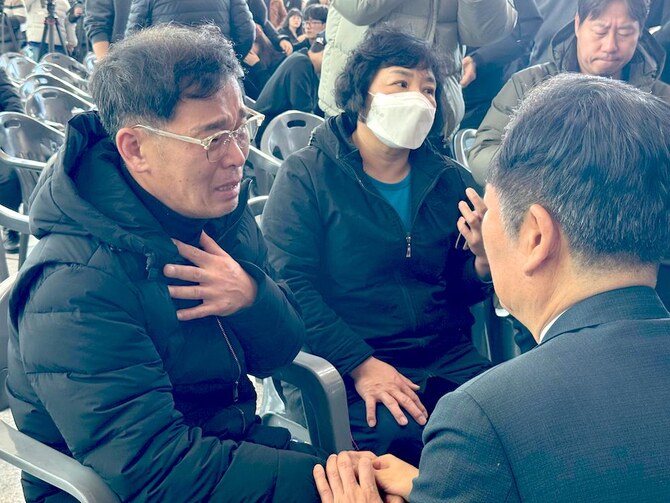MUAN, South Korea: South Koreans ended the year in nationwide mourning on Tuesday, with bereaved families gathered at Muan Airport to receive the bodies of their loved ones killed in the deadliest-ever aviation disaster on the country’s soil.
The crash of Jeju Air flight 7CC216 from Bangkok to the southern Muan County on Sunday killed 179 people when the plane skidded off the runway, hit a concrete mound and exploded into flames. Only two people — both flight attendants — survived.
Investigators have recovered over 600 body parts from the crash site so far, as relatives and friends waited at the airport for authorities to release the victims’ remains.
“I am sorry the identification process took longer than initially promised,” said Na Won-oh, head investigator of the police in Jeonnam Province, where the airport is located.
All but five bodies have been identified as of Tuesday afternoon, as officials began to release the remains in the process expected to take another few days.
All the passengers were South Koreans, except for two Thai nationals.
“I am so heartbroken, and this is so tiring. It is really, really difficult for me,” said Park Han-shin, who lost his younger brother in the disaster.
Cries of angry relatives scolding authorities echoed through the airport, after they discovered that the bodies were spread out on the ground and not placed in refrigerators as officials had promised to do earlier.
“Our brothers, siblings and family are lying on the floor. We had demanded a cold storage unit, but (the government) did not provide it. We have to take back the bodies in good condition,” Park said.
The units were brought in later, following the complaints.
During another round of identification on Tuesday morning, people embraced one another and began to cry as officials read out the victims’ names.
“My daughter is really dead,” a woman said, hugging her husband after they heard their child’s name.
When several lawmakers made their way through the airport’s halls to meet the grieving families, a father cried:
“I just want him to find peace. He is lying there … God knows where … I want to take my son home.”
Another man showed a photo of his son to Korean lawmaker Jung Chung-rae as he fell into sobs.
“He was so handsome. Now I can’t see him,” he said. “We are all just holding it in. We are all just hanging on because we are all going through the same thing.”
South Korea is observing seven days of mourning, with flags flying at half-mast and memorials set up across the nation.
The crash on Sunday was the deadliest aviation accident ever on South Korean soil.
At the Muan airport, families were overseeing the set-up of a memorial, with dozens of black-and-white flowers filling the area. Mourners were trickling in to pay respects for the victims.
“A few people from my neighborhood were also killed. There is a memorial in our town as well, but I wanted to come support the bereaved,” said Nam Eun-hui, who drove almost two hours to reach the site.
“When I first heard of the accident on the news, I thought more people would be saved. I didn’t know it would be such a big tragedy.”























